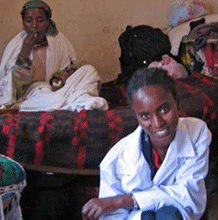Resource Spotlight: Revisiting the Exclusion of Traditional Birth Attendants from Formal Health Systems in Ethiopia
Traditional birth attendants have been a subject of discussion in the provision of maternal and newborn health care, especially in developing countries where there is a lack of infrastructure and trained health personnel. The objective of this study was to assess the role of trained traditional birth attendants in maternal and newborn health care in Afar Regional State.
The findings indicate that trained traditional birth attendants are the backbone of the maternal and child health development in pastoralist communities. However, the current numbers are inadequate and cannot meet the needs of the pastoralist communities including antenatal care, delivery, postnatal care and family planning. The study found that 92% of women (of which 90% were attended to by TBAs) in zone 3 of Afar delivered their last child at home. Without deploying adequate number of trained health workers for delivery service, trained traditional birth attendants remain vital for the rural community in need of maternal and child health care service, especially in areas with poor infrastructure. [from abstract]
View this resource.
The HRH Global Resource Center has other resources on this topic including:
- Human Resource Strategy Options for Safe Delivery
- Skilled Birth Attendants
- Systematic Review on Human Resources for Health Interventions to Improve Maternal Health Outcomes: Evidence from Developing Countries
For additional resources on this topic, visit the Skilled Attendance subject category.
Past Resource Spotlights
- 2515 reads





